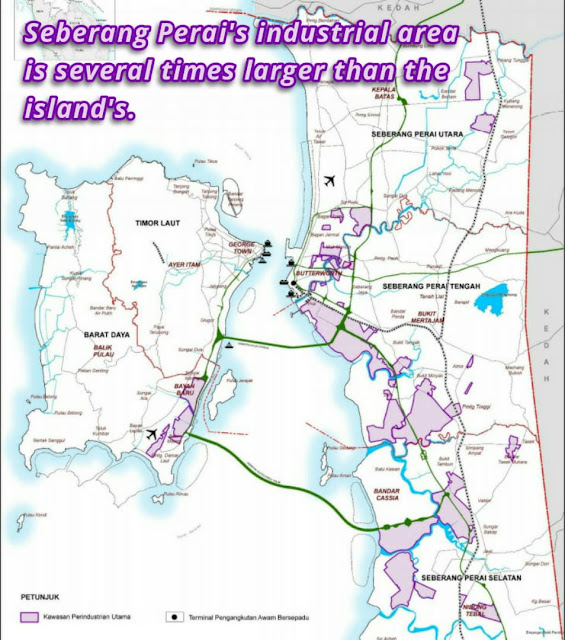Their demand for the cancellation of the Penang South Reclamation (PSR) project is regrettable since that would in effect lead to the dismissal of existing jobs, affecting businesses, and eliminating thousands of potential employments for the people in Penang.
As previously reported, the construction work of the PSR will generate 5,000 jobs in the immediate three years period.[2] This will provide significant monetary inflow into Penang’s economy.
PSR sustains employment in Penang
AnakPinang welcomes this timely stimulus provided by the PSR especially when many Penangites are either retrenched, taking pay cut, or required to take no-pay-leaves during the present Covid-19 crisis.
In the past one and a half year, we have seen the closure of the Equatorial Hotel, the ‘hibernation’ of Entopia Butterfly Farm, and the offering of voluntary separation scheme in many Penang companies.
When many Penangites are struggling to make a living, these NGOs are adding salt to wound by asking for the end of PSR which will lead to more job termination.
These anti-development NGOs and activists have a track record of lobbying for the cancellation of projects, such as the redevelopment of Penang International Sports Arena (PISA) into SPICE Convention Centre and the building of ESCAPE Theme Park.[3]
Right now, they are opposing the PSR and threatening the livelihood of all the employees who are working on the project.
Among the staff members are young local graduates who do not need to leave their family in Penang to work in other states, and local fishermen who can now have a stable monthly income and enjoy the benefits of retirement fund – which they otherwise did not have – without risking their life to work in the sea.
The cancellation of the PSR would mean the termination of these employment, which will be very unfortunate during the current pandemic crisis. The action of these NGOs is callous and cruel.
If they care for the well-being of the people working on the PSR project, these anti-PSR groups should stop lobbying for its termination which would further eliminate jobs in Penang and remove the benefits for the fishermen.
‘Phantom NGOs’
Among these six anti-PSR groups mentioned above, there are those formed by the same individuals. For instance, Meenakshi Raman is the president of Sahabat Alam Malaysia, the chairperson of Tanjung Bunga Residents Association, member of Penang Forum, and legal advisor to Consumer's Association of Penang.
This is one person lobbying under four different groups, giving the public a false impression of widespread support. It is just one of many tactics taken by these individuals to mislead the public. Whether or not this is ethical, we leave to the public to decide.
If the same people vote under different names, we would brand them ‘phantom voters’. But isn’t the action of one individual duplicating his/her action under different groups creating ‘phantom NGOs’?
Furthermore, these anti-development groups always exaggerate negative impact of PSR to mislead the public. For instance, they repeatedly claim that the implementation of PSR will threaten Penang’s food security – even though less than 20% of fishing boats work at the PSR area.[4]
Moreover, the fishery of Penang’s south contributes only 4% to the state’s seafood output, while Penang contributes only 3% to the country’s total.[5] Penang south’s fishery accounts for less than 1% of the nation’s entire output. Penang south is not “the golden zone” for fishery as falsely claimed by Penang Forum spokesperson, Khoo Salma.[6]
Therefore, we implore these anti-development NGOs to stop misleading the public with exaggerated claims to lobby for project cancellation that will lead to jobs elimination.
Development on mainland
These groups’ alternative solution for PSR is to shift industrial development to Seberang Perai, claiming there is more land available there. This is factually wrong and can only be said by those who are ignorant of mainland geography.
Currently, nine out of the ten industrial parks and zones in Penang are located on the mainland. The nine are at Mak Mandin, Perai, Seberang Jaya, Bukit Tengah, Bukit Minyak, Penang Science Park, Penang Science Park North, Batu Kawan Industrial Park 1 and Batu Kawan Industrial Park 2. The one on the island is Bayan Lepas Free Industrial Zone. The total industrial area on mainland is several times larger than on the island.
The fact is that there is not much land for industrial development in Seberang Perai. Most flatland have been developed or used for agriculture. Most flatland have been developed or used for agriculture. As reported previously, the 1,173ha of industrial land allocated in Batu Kawan was left only with 80ha in 2019.
The State Government’s effort to acquire more private land has led to legal entanglement with land owner, with the latest case involving Sime Darby.[7] Such matter may take years to settle while nothing can be done for development.
Those NGOs may believe they are offering alternative solution to PSR when in reality they are unrealistic and uninformed of the facts.
The NGOs’ environmental excuse to cancel PSR and shift development to the mainland is inconsistent as there will also be environmental impact on Seberang Perai.
Given its larger area size, the mainland’s industrial impact to the environment is already more extensive than the island. Increasing industrialisation at Seberang Perai will only make it more extensive compared to the island. So those NGOs’ excuse for shifting industrial development to mainland to avoid environmental impact is delusional.
PSR’s environmental impact can be mitigated and the natural surrounding can be rejuvenated through offset programmes which will lead to the creation of a balanced and more resilient ecosystem for humans and nature. Real environmental work should be based on facts, not on delusions as displayed by the six groups.
[1]https://www.malaysiakini.com/letters/574291, https://www.freemalaysiatoday.com/category/nation/2021/06/03/is-reclamation-worth-it-with-wfh-on-the-rise-asks-penang-group, https://www.freemalaysiatoday.com/category/nation/2021/05/21/its-lose-lose-for-penang-in-psr-privatisation-plan-says-economist, https://www.freemalaysiatoday.com/category/nation/2021/06/02/groups-back-nurul-izzahs-call-to-scrap-psr, https://www.freemalaysiatoday.com/category/nation/2021/06/04/speak-to-fisherfolk-on-benefits-of-psr-group-tells-2-mps, https://www.thevibes.com/articles/news/29690/psi-threatens-penangs-environment-and-fishing-coastal-communities-associations
[3]https://aliran.com/coalitions/penang-forum/two-councillors-break-ranks-to-oppose-mppp-budget/, https://www.thestar.com.my/opinion/letters/2011/11/22/scrap-the-escape-park/
[4]https://www.malaymail.com/news/malaysia/2019/10/24/under-20pc-of-boats-still-fish-in-site-marked-for-reclamation-says-penang-e/1803276
[5]https://www.thevibes.com/articles/news/23919/get-your-facts-right-in-slamming-psr-project-ex-councillor-tells-pas and Lembaga Kemajuan Ikan Malaysia, Laporan Risikan Pasaran 2019, page 12.
[6]https://www.malaysiakini.com/news/478867
[7]https://www.theedgemarkets.com/article/sime-darby-plantations-granted-leave-challenge-penang-land-grab

